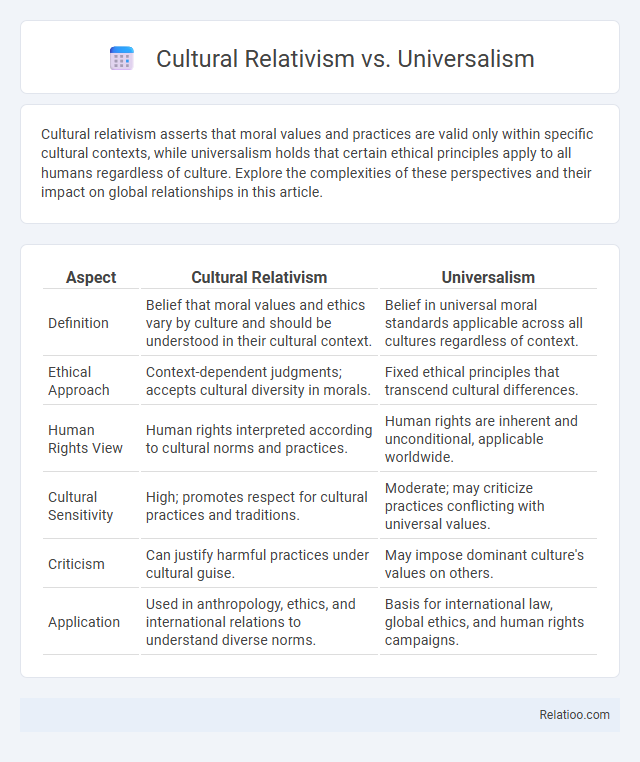Cultural relativism asserts that moral values and practices are valid only within specific cultural contexts, while universalism holds that certain ethical principles apply to all humans regardless of culture. Explore the complexities of these perspectives and their impact on global relationships in this article.
Table of Comparison
| Aspect | Cultural Relativism | Universalism |
|---|---|---|
| Definition | Belief that moral values and ethics vary by culture and should be understood in their cultural context. | Belief in universal moral standards applicable across all cultures regardless of context. |
| Ethical Approach | Context-dependent judgments; accepts cultural diversity in morals. | Fixed ethical principles that transcend cultural differences. |
| Human Rights View | Human rights interpreted according to cultural norms and practices. | Human rights are inherent and unconditional, applicable worldwide. |
| Cultural Sensitivity | High; promotes respect for cultural practices and traditions. | Moderate; may criticize practices conflicting with universal values. |
| Criticism | Can justify harmful practices under cultural guise. | May impose dominant culture's values on others. |
| Application | Used in anthropology, ethics, and international relations to understand diverse norms. | Basis for international law, global ethics, and human rights campaigns. |
Introduction to Cultural Relativism and Universalism
Cultural relativism asserts that moral values and practices are understood relative to specific cultural contexts, emphasizing respect for cultural diversity and opposing ethnocentric judgments. Universalism maintains that certain ethical principles, such as human rights, apply universally regardless of cultural differences, asserting the existence of common moral standards. Exploring the tension between cultural relativism and universalism illuminates key debates in ethics, anthropology, and international human rights law, highlighting challenges in balancing cultural sensitivity with global justice.
Defining Cultural Relativism
Cultural relativism asserts that moral values and practices are understood within the context of a specific culture, emphasizing that ethical norms vary and should not be judged by external standards. This perspective challenges universalism, which argues for consistent moral principles applicable to all humans regardless of cultural differences. Understanding cultural relativism helps You navigate ethical diversity by recognizing that cultural contexts shape what is considered right or wrong.
Understanding Universalism
Understanding Universalism involves recognizing fundamental human rights and ethical principles that apply across all cultures, regardless of individual customs or traditions. Universalism asserts that certain moral values, such as equality, freedom, and justice, are universally valid and should guide global human rights frameworks and legal systems. This perspective contrasts with Cultural Relativism, which emphasizes cultural context and the diversity of moral norms, but Universalism prioritizes common standards that transcend cultural differences.
Historical Context and Philosophical Roots
Cultural relativism, rooted in early 20th-century anthropology by Franz Boas, emphasizes understanding cultures on their own terms without imposing external judgment, reflecting a reaction against ethnocentrism prevalent in Western colonialism. Universalism, with origins in Enlightenment philosophy and human rights discourse, advocates for inherent, inalienable rights applicable across all cultures, grounded in rationalist and moral absolutist traditions. These philosophical roots illustrate a persistent tension in ethics and human rights between respecting cultural diversity and asserting universal moral principles.
Key Arguments for Cultural Relativism
Cultural relativism argues that moral values and ethical standards are culturally bound and should be understood within the context of each society's traditions and beliefs. It emphasizes respect for cultural diversity by rejecting universal moral judgments, suggesting that no culture's ethics are superior to another's. Understanding these key arguments helps you appreciate the importance of context in evaluating cultural practices without imposing external standards.
Major Principles of Universalism
Universalism asserts that certain rights and ethical principles apply universally, transcending cultural and social differences, emphasizing fundamental human rights such as freedom, equality, and justice. This principle promotes a standardized set of moral values that protect individual dignity regardless of cultural context, often underpinning international human rights laws and treaties. Universalism challenges cultural relativism by arguing that some practices cannot be justified by cultural norms when they infringe on universally recognized human rights.
Notable Conflicts and Case Studies
Notable conflicts between cultural relativism and universalism often arise in human rights debates, such as practices like female genital mutilation (FGM) and child marriage, where universalist perspectives emphasize inalienable rights while cultural relativists argue for respecting cultural contexts. The case of the 2010 UN resolution on combating harmful traditional practices highlights this tension, with universalists pushing for global norms and relativists cautioning against imposing Western values on diverse societies. Another prominent case is the controversy over forced marriage laws in some indigenous communities, where universal human rights frameworks clash with cultural practices defended under the banner of cultural autonomy.
Impacts on Human Rights and Global Ethics
Cultural relativism emphasizes the importance of understanding human rights within the context of specific cultural norms, often leading to debates about the variability of ethical standards across societies. Universalism advocates for a set of inalienable human rights that apply to all individuals regardless of cultural context, promoting consistent global ethical frameworks. The tension between these perspectives impacts international law, humanitarian interventions, and the enforcement of human rights, challenging policymakers to balance respect for cultural diversity with the protection of universal moral principles.
Contemporary Debates and Criticisms
Contemporary debates around cultural relativism and universalism center on the balance between respecting diverse cultural practices and upholding universal human rights standards. Critics argue that strict cultural relativism may excuse harmful traditions, while universalism risks imposing dominant cultural norms on others. Your understanding of these perspectives is crucial for navigating ethical decisions in increasingly globalized and multicultural contexts.
Bridging Perspectives: Toward Ethical Pluralism
Cultural relativism emphasizes understanding ethical practices within their cultural context, whereas universalism advocates for consistent moral principles applicable across all societies. Bridging these perspectives involves ethical pluralism, which recognizes multiple valid moral frameworks while seeking common ground for mutual respect and global cooperation. This approach fosters dialogue that values cultural diversity without abandoning fundamental human rights.

Infographic: Cultural relativism vs Universalism
 relatioo.com
relatioo.com